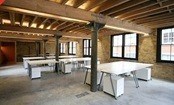Red Bull HQ Stunning Design
Central London is full of companies who use their office space to impressive effect, including Google and their vib...
Click to read more...

Central London is full of companies who use their office space to impressive effect, including Google and their vib...
Click to read more...If you are looking for the best office spaces in Noho or Waterloo for your business, then there are a number of great options available in the mark...
Click to read more...Are you thinking of relocating your company offices to Hammersmith or Kings Cross?
If you are, then you need to take some essential points ...
Click to read more...If you are thinking of relocating your company office or open new ones, then it is best to consult a professional for the process. There are a numb...
Click to read more...An office fit out can either be an exciting new venture or a stressful burden. As well as requiring weeks of meticu...
Click to read more...Is Conventional Lease Right for Your Business?
Â
If you are a business owner looking for an appropriate business space, it is important for you to know the difference between various types of offices that you could start or move your business in. A leased office is also referred to as a conventional or traditional office, and is let to a business owner by its landlord for a certain period of time.
Â
Most conventional leases in London stretch to a duration of either 5 or 10 years, depending on the discretion of the property-owner and the needs of the prospective leaseholder. Often, it is possible to settle upon a break clause at the 3rd or 5th year respectively.
Â
The Features of a Conventional Office Space
A conventional office space is leased at a cost per square foot of area on a yearly basis and the lessee is required to pay the associated rent, rates and service charges. Usually, the interiors can be utilised in their entirety as per the requirements of the lessee, barring certain instances where landlord’s consent might be necessary. The renter is expected to manage and maintain all facilities including planning of space, installing furniture and fit out, cleaning, setting up IT and telephone network, paying utility bills and service expenses.
Â
Most traditional offices are offered as open plan spaces, unfurnished and minus IT and telecom facilities. Common restrooms and kitchen areas either exist within the building or the renter might need to build these within the rented space. On the other hand, some conventional offices might come already fitted out.
The Advantages and Disadvantages of a Conventional Office
Let’s discuss the pros and cons of a leased office space as against serviced or co-working office spaces:
Benefits:
- One of the major benefits of a conventional office is the opportunity to build your Brand Identity through signage at the entrance or façade of the building, and at the entrance of your workplace. Hence, it offers a greater scope to project your business image.
- It provides greater control over using and managing your office space.
- You can opt for longer terms of lease if your business is an established one.
- You end up incurring significantly lower costs as compared to equivalent serviced and co-working office spaces.
Dissadvantages:
- Deal finalisation usually takes a lot longer compared to serviced and co-working office spaces.
- Usually, a renter typically needs to bear the expenditure of office fit-out or renovation, and needs to purchase or lease own furniture.
- The lessee needs to shoulder the responsibility of annual service charges, utility costs and other similar charges.
- A conventional lease usually includes complete repairing and insurance terms and no internal services are generally included.
- At the end of the lease term, usually, the fit-out needs to be removed by the tenant and the rented space must be returned in the condition exactly when the lease was finalised.
Â
You must weigh all the options and judge their respective pros and cons carefully before finalising on your business location. Opt for a conventional office only if you are looking for a permanent business location to build your own business space, by investing sufficient time and resources. If you are considering housing a substantial number of employees and need plenty of additional space for storage or display, then a conventional office is the best bet for your business.
